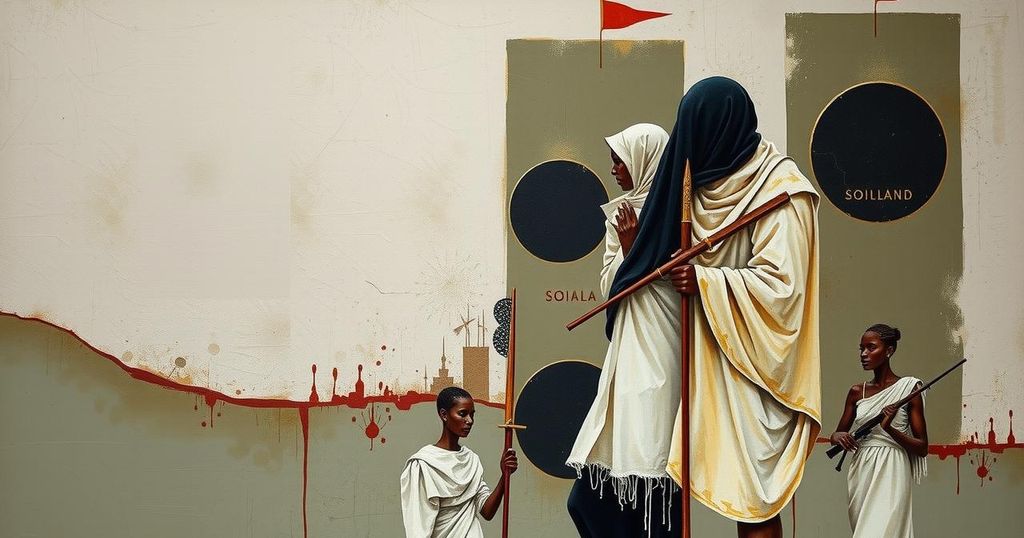Discontent in Somaliland over Trump’s Gaza Displacement Plan

The U.S. and Israel are considering Somaliland for relocating Palestinians from Gaza following Arab nations’ rejection of Trump’s proposal. Somaliland seeks recognition, offering military access in return. Despite potential offers, local leaders express concerns amid increasing pro-Palestinian sentiment. Somalia firmly opposes any plans infringing Palestinian sovereignty, amidst its own political turmoil.
The U.S. and Israel are exploring the Horn of Africa as a relocation destination for Palestinians from Gaza as part of Trump’s controversial plan, following rejection by Arab nations. Their primary focus is Somaliland, which has sought international recognition as an independent state for decades. On March 14, the Associated Press reported undisclosed discussions between American and Israeli officials and both Somalia and Somaliland, potentially leveraging internal rivalries to implement the relocation proposal.
Somaliland has historically desired sovereignty, offering to grant U.S. military access to its strategic seaport in exchange for recognition. With Washington contemplating a deal that may alter its longstanding support for Somalia’s territorial integrity, Somaliland’s leaders could perceive a path toward recognition through Trump’s displacement strategy. The plan suggests relocating Gaza’s 2.3 million inhabitants, while U.S. administrative oversight would transition the region into a real estate development, dubbed the “Middle East Riviera.”
Israeli far-right leaders have long envisioned the displacement of Palestinians, now considering Trump’s plan as a feasible course. Tel Aviv and Washington are preparing to gather financial and diplomatic incentives, similar in strategy to the Abraham Accords. However, the context has shifted post-war on Gaza, as global support for Palestinians strengthens, particularly within historically colonized regions, including Africa.
Moustafa Ahmad, a researcher based in Somaliland, expressed skepticism regarding the plan’s viability, noting that public solidarity with Palestine may render any resettlement plan controversial and unacceptable. He added, “Even key U.S. allies—Egypt, Jordan, and Saudi Arabia—have rejected similar proposals.”
The United Arab Emirates (UAE), an ally of Somaliland, may play a critical role in negotiations while upholding ties with Israel. However, despite its relationship with both parties, the UAE has favored Egypt’s approach to Gaza reconstruction, diverging from Trump’s strategy. President Abdirahman Mohamed Abdullahi “Irro” has publicly dismissed the existence of talks and stated that his government would only consider a formal U.S. proposal if one were presented.
In Somalia, political turmoil is evident as President Hassan Sheikh Mohamud’s administration faces a constitutional crisis fueled by Puntland’s withdrawal of recognition from the federal government. This internal division presents an opportunity for the militant group al-Shabaab, which has exploited the situation to conduct violent attacks, exemplifying the deteriorating security landscape.
Despite U.S. interest in the region, Somali officials remain resolute against the forced relocation of Palestinians. The Foreign Minister, Ahmed Moalim Fiqi, did not confirm any ongoing outreach from the U.S., affirming that Somalia would resist any measures to undermine Palestinian sovereignty. Somalia continues to fortify its pro-Palestinian stance, supporting resolutions denouncing Trump’s proposal at the recent Arab League summit. Moustafa Ahmad remarked on the historical confluence of extremist narratives with Palestinian struggles, reinforcing the likelihood of Somalia maintaining its supporting position amid rising instability.
The exploration of Somaliland as a potential relocation site for Palestinians highlights the intersection of international diplomacy and regional dynamics within the Horn of Africa. While Somaliland may see the possibility of U.S. recognition through Trump’s plan, strong public sentiment and internal rivalries present significant obstacles. Meanwhile, Somalia’s firm stance against participation in any displacement scheme aligns with its ongoing support for Palestine. As regional tensions rise, the outcomes of these discussions and political developments remain uncertain, with implications for both local and broader geopolitical landscapes.
Original Source: www.newarab.com








